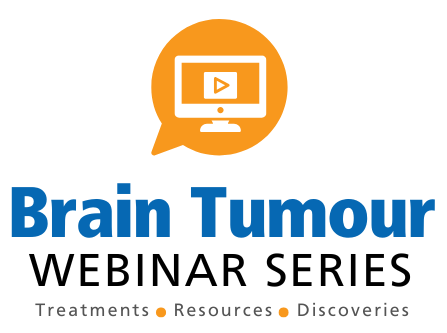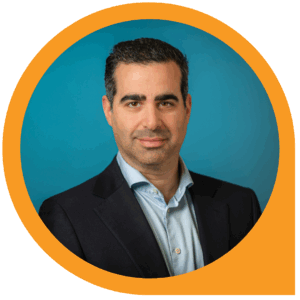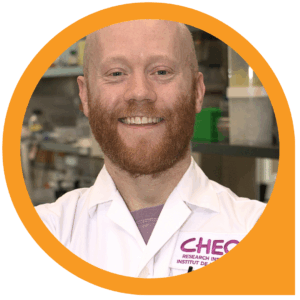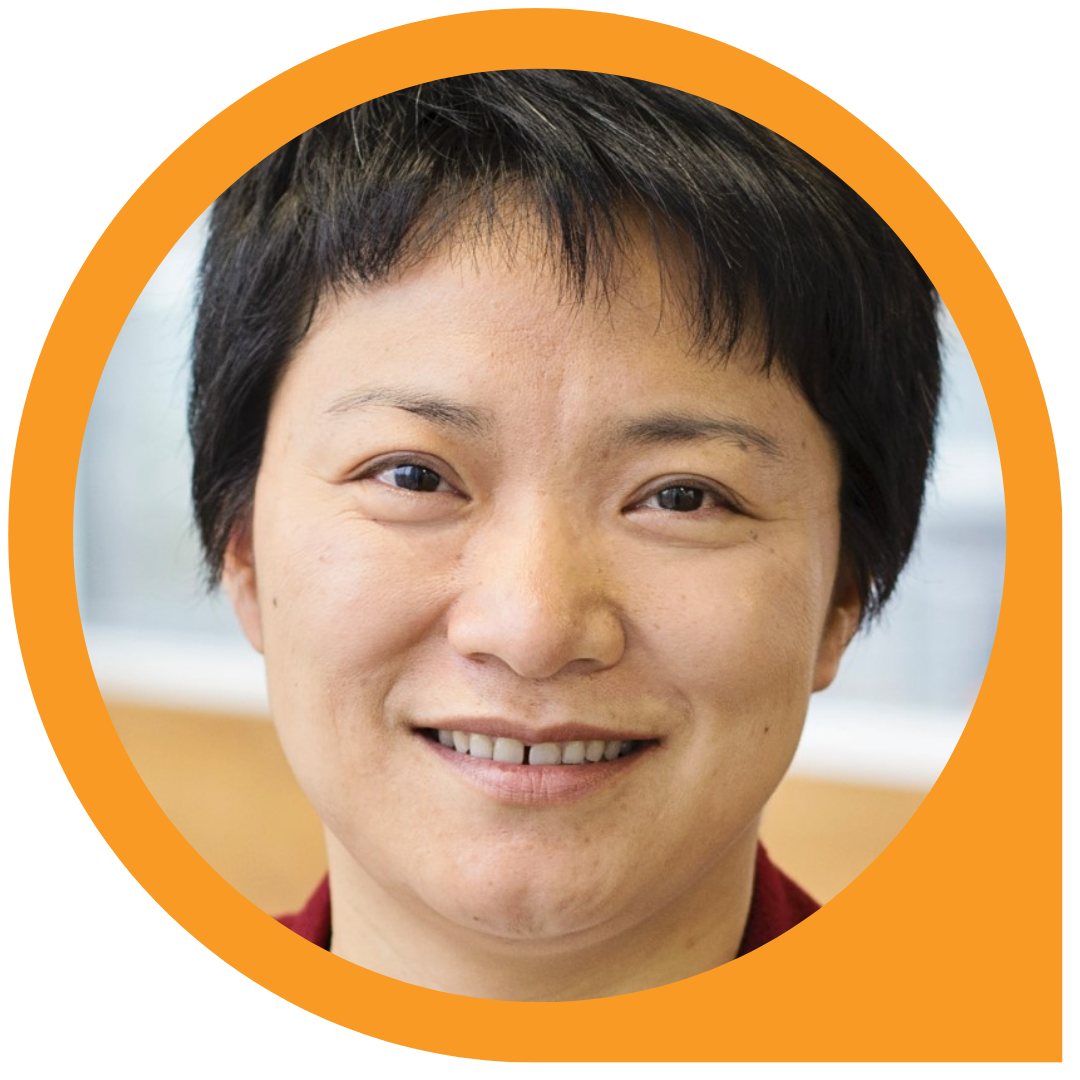Get Involved
There are so many ways you can help make a difference in the lives of patients and families today.
Find the educational and support tools you need right here.

Welcome to our free webinar series—designed for anyone impacted by a brain tumour, including patients, survivors, caregivers, and volunteers, as well as health-care professionals and researchers looking to deepen their understanding of the disease.
These sessions explore a wide range of topics such as neuro-oncology, neurosurgery, research advancements, psychosocial oncology, mental health and caregiver support.
To stay up to date on upcoming webinars and schedule changes, we invite you to subscribe to our newsletter.
 Effective Communication Strategies for Caregivers
Effective Communication Strategies for CaregiversPresented by: Ms. Anne-Marie Bouthillette, Regional Lead for Eastern Ontario and Francophone Communities, The Ontario Caregiver Organization
Date: March 18, 2026
Time: 12 p.m. to 1 p.m. EST
Caregivers can experience challenges when communicating with others. This could include health care providers, community organizations, or informal support from friends and family. They can be misunderstood and have difficulty getting their message across, leading to frustration and further communication breakdowns. Building skills and strategies for effective communication can ensure that both the caregiver’s and the person they care for’s needs are heard and understood. The ability to stay solution-focused during challenging times can set everyone involved up for success.
Learning objectives:
During this session, we work with the Effective Communications Strategies for Caregivers tip sheet.
About the speaker:
Anne-Marie is the OCO’s Regional Lead for Eastern Ontario and Francophone Communities. She joined the organization in the fall of 2024, after 17+ years in child welfare. Anne-Marie has lived experience as a caregiver, having supported her mother, who was living with Parkinsons; she is also a caregiver to her adult daughter, who has struggled with her mental health for the last 12 years. Anne-Marie is very passionate about supporting caregivers, and is looking forward to telling you more about how the OCO can become an important partner in your caregiving journey.

Presented by: Dr. Nir Lipsman, neurosurgeon, Sunnybrook Health Sciences Centre
Date: Wednesday, Feb. 18, 2026
Time: 12 p.m. to 1 p.m. EST
Despite advances in oncology, cancers of the central nervous system remain among the most deadly. Unique features of the brain, such as the blood brain barrier, impose physical obstacles to therapeutic delivery, contributing to the poor prognosis of patients with these conditions. Focused ultrasound is an emerging technology that allows the non-invasive delivery of ultrasound energy to focal brain targets with great precision. This presentation will focus on current and emerging uses of focused ultrasound for brain disease, with a specific focus on the potential treatment of neuro-oncologic disease.
Learning objectives:
About the speaker:
Dr. Nir Lipsman is the Dan Chair of Neurosurgery at the University of Toronto, staff neurosurgeon at Sunnybrook Health Sciences Centre, and senior scientist at Sunnybrook Research Institute.
He completed a medical degree at Queen’s University and a neurosurgical residency at the University of Toronto, during which he completed his PhD investigating the clinical and imaging correlates of neuromodulation in patients with treatment-resistant neuropsychiatric disease.
He currently holds the Harquail Family Endowed Chair as the Director of Sunnybrook’s Harquail Centre for Neuromodulation, where over the last 10 years, he has led several world-first clinical trials of MR-guided focused ultrasound (FUS), including the world’s first experience of FUS in essential tremor, obsessive compulsive disorder and depression, and global-first trials of FUS-enhanced BBB opening in primary and secondary brain tumours, Alzheimer’s Disease, ALS and Parkinson’s disease.
 Glioblastoma: Exploring the biological underpinnings of why this cancer remains so hard to treat
Glioblastoma: Exploring the biological underpinnings of why this cancer remains so hard to treatPresented by: Dr. Kyle Malone, Postdoctoral Fellow, Department of Biochemistry, Microbiology & Immunology, University of Ottawa
Date: January 21, 2026
Time: 12 p.m. to 1 p.m. EST
Glioblastoma (GBM) is the most common and deadly primary brain tumour. Despite very involved and expensive treatment consisting of surgical resection, radiotherapy and chemotherapy, as well as decades of research furthering our understanding of GBM biology, prognoses remain poor. In this talk, we’ll cover numerous aspects of GBM biology that contribute to its stubborn treatment resistance, including: how GBM survives the current standard of care; how cells die and what is altered in GBM relative to healthy cells in the brain; the cellular heterogeneity within a tumor and between patients; and the impact of the brain location on GBM biology, treatment resistance and anti-tumour immunity. In this webinar, you will learn to: Understand the major ways that cells die, and how changes to these pathways affect GBM treatment efficacy Be aware of the cellular diversity within a single GBM tumour and between patients that contributes to treatment failure Understand how the brain location contributes to GBM treatment resistance.
Learning objectives:
About the speaker:
Dr. Kyle Malone completed his Master’s in Neuroscience and his PhD in Microbiology and Immunology, studying how cell death and the immune system shape new treatment possibilities for Glioblastoma. As a postdoctoral fellow at the University of Ottawa and CHEO Research Institute, he investigates ways to make GBM more vulnerable to treatment and to strengthen immune-based therapies. His work includes testing small-molecule drugs and engineered natural killer cells to improve how the immune system targets GBM.

Presented by: Dr. Yuan, professor at the University of Alberta’s School of Public Health
Date: November 12, 2025
Time: 12 p.m. to 1 p.m. EST
Primary brain tumours are heterogeneous, with different treatment pathways and prognoses depending on their classification. Due to their location, all brain tumours, regardless of their malignancy, can be debilitating. In this talk, we will share key findings from the most recent data including incidence rates, prevalence rates, and survival rates of 25 brain tumour groups, classified based on location and histology. These rates are based on analysis of the vital status linked to Candian Cancer Registry data.
We’ll also introduce and give a brief demonstration of our publicly available data tool that provides users with easy access to Canadian brain tumour statistics, allowing you to explore information by age, sex, region, and histology.
Learning Objectives:
Speaker bio:
Dr. Yuan obtained a PhD degree in Statistics from the University of Waterloo in 2008 and joined the School of Public Health at the University of Alberta in 2011. Her research program focused on developing and applying biostatistical methods in cancer related to population health and biomedical research. Dr. Yuan’s ongoing applied health research focuses primarily on two areas: one is risk prediction of late effects in childhood cancer survivors and the related methodology aspect; and the other is brain tumour surveillance and developing artificial intelligence tools for improving cancer surveillance.

Presented by: Renee Moor, Executive Director, Journey Home for Empowered Living and Dying
Date: November 18, 2025
Time: 12 p.m. to 1 p.m. EST
This heartfelt session explores the often-unspoken grief experienced by caregivers as they accompany a loved one through illness, decline, and death. From anticipatory grief to the quiet sorrow that lingers beyond loss, caregivers carry a unique emotional burden that can be deeply isolating. Together, we’ll create space to acknowledge and honour the evolving roles, shifting identities, and layered emotions that caregivers navigate. We will also reflect on how grief differs depending on the nature of the relationship, whether with a parent, spouse, child, or friend, and how communities can better support those walking these paths. Through compassionate dialogue and shared insight, this session invites connection, validation, and healing.
Learning Objectives:
Speaker bio:
Renee Moor is a Buddhist psychotherapist, certified death doula, yoga and meditation teacher, and Usui Reiki master. Her work is rooted in the belief that every individual deserves emotional, spiritual, and practical support at the end of life. Following the profound personal losses of both her father and husband within a 16-month span, Renee was deeply moved by the gaps in care and companionship available during these transitions. In response, she founded Journey Home for Empowered Living and Dying, a registered charity based in Dundas, Ontario. The organization provides compassionate, community-based services including death doula support, grief counselling, public workshops, and educational programming. Through advocacy and care, Journey Home is committed to helping individuals and families navigate death and dying with dignity, presence, and peace, creating space for meaningful and empowered end-of-life experiences.

Presented by: Dr. Teresa Purzner, Clinician Scientist Neurosurgeon, Queen’s University/ Kingston Health Sciences Centre
Date: October 15, 2025
In this presentation we will discuss how academic and entrepreneurial approaches were combined to create a user-centric, rapidly adaptive brain tumour program.
In this webinar, you will learn to:
Speaker bio:
Dr. Teresa Purzner earned her MD in 2009 and completed four years of neurosurgical residency in Toronto before pursuing a PhD in developmental neurobiology at Stanford University. There, she combined mass spectrometry with developmental biology to identify novel therapeutic targets for pediatric brain tumours, leading to the discovery of a new drug target in medulloblastoma. In collaboration with Stanford SPARK and the Pediatric Brain Tumor Consortium, she helped translate this discovery into a first-in-child clinical trial of a CK2 inhibitor. Her work has been recognized with numerous awards, including the Stanford Interdisciplinary Graduate and BioX Fellowship, the Annual Award of the American Academy of Neurological Surgery, the Weston Havens Foundation Award, the AANS Louise Eisenhardt Award, and the Neurosurgery Research and Education Fellowship. In 2021, she was named one of Canada’s Top 40 Under 40. Dr. Purzner is also the founder of Cerebelly, a science-based baby food company focused on early brain development, now available in over 15,000 stores across North America. Dr. Purzner now runs a neurosurgical practice and translational research lab at Queen’s University with her husband, Dr. James Purzner. Together, they focus on advancing care and scientific understanding for patients with brain tumours through integrated clinical and research innovation.

Presented by: Dr. Angela Sekely, Neuropsychologist, Department of Supportive Care, Pencer Brain Tumour Centre, Princess Margaret Cancer Centre
Date: September 24, 2025
Cognitive symptoms are common among individuals living with brain tumours and can significantly affect daily life and well-being. This webinar will explore cognitive symptoms that may occur, such as difficulties with memory, attention and communication. The underlying causes of these symptoms will be reviewed, including the impact of the tumour on the brain and the effects of treatment, such as surgery, radiation, and chemotherapy. Evidence-based strategies and practical tools will be presented to help individuals manage cognitive challenges and support quality of life.
Learning Objectives:
Speaker bio:
Dr. Angela Sekely is a neuropsychologist at the Pencer Brain Tumor Center and Pediatric Aftercare Program at the Princess Margaret Cancer Centre. Her clinical practice encompasses neuropsychological assessment for adults with primary brain tumours and adult survivors of pediatric cancers. Angela is involved in the clinical supervision of graduate students and research. Her research focuses on investigating the effects of cancer and its treatment on cognitive, psychological, and functional outcomes, and ways to help improve functioning.

Presented by: Susannah Juteau, Registered Dietitian, Ottawa Cancer and Lymphatics Center
Date: August 13, 2025
Discover how the foods you eat can power your brain! In this presentation, we’ll explore 10 simple, science-backed steps to nourish your brain, boost memory, support mood and improve focus, naturally. Whether you’re looking to sharpen your thinking, reduce brain fog, help reduce chances of recurrence, or simply feel your best, these practical nutrition tips will help you take care of your brain “one bite at a time”.
Learning Objectives:
Speaker bio:
A brain tumour diagnosis can make the world of nutrition even more confusing and overwhelming than it was before. Add some Netflix documentaries to that, and you can be left in total fear of food. Susannah Juteau‘s primary goal as a Registered Dietitian is to help you navigate the overwhelming amount of information by separating fads from facts. This way, you can create a personalized diet plan tailored to your preferences, lifestyle, budget, sensitivities and more.
Following a 10-hour brain surgery to remove a benign brain tumour back in 2013, Susannah suffered with constant, debilitating headaches, out-of-whack hormones and completely sapped energy levels. She felt a lack of control and that her body had betrayed her. After trying everything and attending every possible appointment, she almost gave in to the advice of “just accept it.” Then, she had a moment of clarity. None of the health professionals ever discussed nutrition with her. She drew on her background in Neuroscience and Nutrition and dove deep into the research, beyond the generic nutrition information. She now devotes her expertise to helping others navigate, not only what to eat, but also when to eat it, so that they can find their glow and feel like themselves again.
Nutrition has a profound impact on repairing gut health, enhancing mental clarity and reducing fatigue, and aiding in coping with stress. A properly tailored plan can also reduce your risk of recurrence and improve medication side effects. Let’s bust through some biases and peel away the fear tactics to leave you with a healthy, balanced approach to feeding your body.

Presented by: Dr. Dawn Richards, Director of Patient and Public Engagement, Clinical Trials Ontario
Date: June 11, 2025
Have you ever wondered what clinical trials are, or are you not quite sure about them? Come learn about what clinical trials are and why they’re done. If you’re thinking about participating in a clinical trial, learn more about what your rights are as a participant and some questions you might consider or ask before you make your decision. There will be plenty of time to ask any questions you have as well.
Learning Objectives:
Speaker bio:
Dawn Richards, PhD, is the founder of Five02 Labs Inc., and Director of Patient and Public Engagement at Clinical Trials Ontario. With a PhD (Analytical Chemistry) from the University of Alberta, and experience in a variety of roles over the past 20 years, it is her diagnosis with rheumatoid arthritis in 2006 that started her journey to combine her passion for science with making the most of her diagnosis. In her role at CTO, Dawn is charged with executing on CTO’s strategic pillar of patient and public engagement.

Presented by: Dr. Yuan, professor at the University of Alberta’s School of Public Health
Date: May 21, 2025
Metastatic brain tumours or brain metastasis (BM) occur when cancer cells spread from other parts of the body to the brain. Although brain metastases are more frequent than primary brain tumours, we still don’t have a clear picture of when, how often and in whom they occur after a cancer diagnosis, across the population.
In a recent study, Yan’s team developed artificial intelligence tools, specifically Natural Language Processing (NLP) algorithms based on the BioBERT model, that were trained to label brain metastases (BM) in radiology reports and to predict the occurrence of BM in cancer patients in Alberta from 2012 to 2022.
In this webinar, Yan will discuss how they trained and tested these AI tools, how well they performed and some initial findings about the predicted frequency of brain metastases in the population.

Presented by: Nour Nafisa, Naturopathic Medical Graduate
Date: April 23, 2025
This presentation provides an in-depth look at evidence-based nutrition and lifestyle strategies to support individuals with brain cancer—whether they are undergoing active treatment, in recovery, or aiming to prevent recurrence.
Grounded in current research, the session explores how dietary interventions, physical activity, stress management, and sleep optimization can not only improve overall well-being and clinical outcomes but also help address common treatment-related side effects such as fatigue, nausea, appetite changes, cognitive challenges, and inflammation.
Attendees will gain practical tools to incorporate these integrative strategies into patient care plans. Ideal for patients, caregivers and advocates seeking a holistic, science-backed approach to brain cancer support.
